PARIS — French President Emmanuel Macron accused Washington of failing to address a loss of trust in technology firms and having a laissez faire approach to regulation that is not “politically accountable.”
“Im going to be very blunt with you,” Macron told an audience at the Vivatech conference in Paris attended by dozens of tech CEOs, including Facebooks Mark Zuckerberg.
“You have a U.S. model [for technology firms] which is not regulated,” he said. “It was very good for innovation at the beginning but this model is now being jeopardized and is in a lot of trouble.”
Amid broader transatlantic tensions over trade, Macrons criticism highlighted a widening gulf between Washington and Europe over regulation of the technology sector, after a global scandal in which the personal data of 87 million Facebook users was compromised.
U.S. Congress grilled Facebook chief executive Mark Zuckerberg over the scandal in March. But despite expressions of outrage over a loss of trust, lawmakers failed to follow up with any legislative proposals on how to prevent the mishandling of personal data.
“For me the U.S. model is no longer sustainable because there is no political accountability” — Emmanuel Macron
By contrast, the European Union — whose parliament questioned Zuckerberg this week — is about to impose the strictest set of privacy rules in the world.
And EU leaders want to go much further.
The French parliament is examining a draft law that would hold platforms such as Facebook accountable for fake news, especially during election periods.
Macron said in his speech that he would fight “until the end” to impose a European tax on digital giants, which would apply to their turnover instead of their profits.
And top EU officials want to revamp Europes e-Commerce directive, a landmark law from 2000 that underpins the legal situation of technology firms and e-retailers in the EU.
The United States? Not so much.
Despite U.S. President Donald Trumps criticism of Amazon as a dominant player which he says exploits the U.S. Postal Service, there is no push for federal tech-centric laws. Republican Senator Chuck Grassley is a lone voice calling for a wider discussion about data privacy.
That situation, said Macron, could not continue. U.S. politicians at some point would have to address frustration over global tech companies that pay less tax proportionally than entrepreneurs at the national level.
“For me the U.S. model is no longer sustainable because there is no political accountability,” he said, adding that Chinas approach to digital innovation is also not a model for Europe to follow because data collection is “over centralized.”
Macrons pitch
The broadside against U.S. attitudes was part of an impassioned pitch to the 50-odd CEOs and thousands of entrepreneurs who gathered in Paris for Vivatech: Invest in France. Create jobs and businesses here and you wont be disappointed.
“France is changing like crazy,” Macron said in a speech that veered, often from sentence to sentence, between English and French.
Frances giant firms have understood that they have more to gain from encouraging innovation and funding startups than trying to stifle it, he said.
A reform of labor rules and upcoming changes to the tax system are also creating a much more favorable environment for tech investment.
“This huge transformation is just beginning,” he said. “France is back and you can choose France.”

Facebooks CEO Mark Zuckerberg (R) meets with French President Emmanuel Macron (L) at the Elysee presidential palace after the “Tech for Good” summit in Paris on May 23, 2018 | Christophe Petit Tesson/AFP via Getty Images
The subtext to his pitch: Signalling that France — not Britain or Germany — should be the place U.S. tech CEOs look when they want to create jobs, despite the tough attitude to regulation.
Macrons appeal seems to be working, to an extent.
Uber announced Thursday that it is investing €20 million over the next five years into a flying car research center in Paris. Facebook, IBM and Microsoft have all made similar investments, for programs on artificial intelligence research.
And yet nothing underscored Frances popularity quite like the high-profile guest list for Macrons mini tech summit at the Elysée presidential palace. Zuckerberg, Ubers Dara Khosrowshahi, Intel Corps Brian Krzanich and Microsofts Satya Nadella were all present.
None managed the short trip over to London.
Macron wanted to make sure to press his advantage.
“I have something to ask you,” he said at the end of his speech. “Its come back every year.”
[contf] [contfnew]







